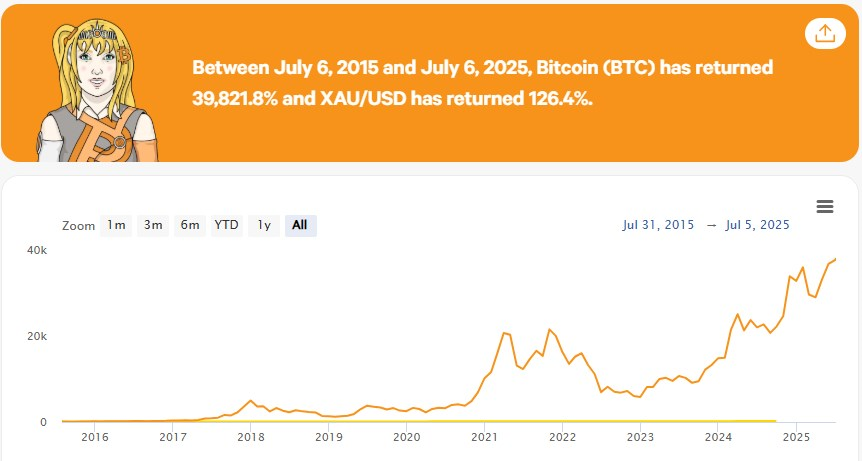In our opinion – No, though there are obviously those who disagree. Gold is difficult (and expensive) to mine, to store, to insure and to transport. Difficult to spend.
Bitcoin is better on all these points. It’s digital, has no centralised control, can be transferred in minutes and is getting easier to spend.
And the graph below shows the relative performance:

Bitcoin returned 39,821.8% vs. gold's 126.4%.
Let’s break this down a bit.
Why gold?
It’s been around for centuries as a trusted safe haven asset and has performed particularly well during periods of inflation and economic uncertainty. It’s been on a tear over the last two years as global debt appears to be spiralling out of control – meaning governments have little hope of paying back this debt other than through the issue of even more debt. In 2020, gold surged 25% as the world grappled with the aftershocks of the global pandemic. It is tangible, durable (lasts thousands of years) and is universally recognised as a safe store of value.
It can be purchased in coins like the Krugerrand, in bars or in jewellery but with this comes the need for safe storage and insurance – which adds to the cost of ownership. You can also purchase fully-backed digital gold through Paxgold or Mesh.Trade.
For those who want to avoid the hassle of storage and insurance, there are gold exchange traded funds such as SPDR Gold Shares (GLD) or iShares Gold Trust (IAU). South Africans who want to track the rand price of gold can load up on the Absa NewGold ETF or 1nvest Gold ETF.
For those that want a little more zest to their gold exposure, you can buy gold shares (like AngloGold Ashanti, Harmony, Newmont and Barrick Gold).
The downside: Gold does not pay a dividend so you are betting on the price moving up – actually a pretty safe bet given the global addiction to debt. As mentioned earlier, storage and insurance costs can take some of the sweetness out of it, and selling physical gold can be a challenge – not impossible, but nothing like selling bitcoin which can be done in seconds.
Why bitcoin?
Bitcoin is called digital gold because it has shown itself to be an incredible store of value and a hedge against economic uncertainty. Take a look at the table above to see what the returns have been over the last decade. Anything growing at 47% every year for a decade (not in a smooth line of course) is worth holding.
While gold supply increases 1-2% a year, bitcoin’s supply is fixed at 21 million coins. It can never be inflated above this amount. It is highly liquid, meaning it is easy to buy and sell 24/7 on hundreds of exchanges across the world, and requires no physical storage. For tech-savvy investors, bitcoin represents a hedge against traditional financial systems and a bet on the growing adoption of cryptocurrencies.
Institutions have started to fall in love with bitcoin over the last two years following regulatory changes that allow for bitcoin-backed ETFs. The total value of all bitcoin ETFs stood at $76 billion earlier this year, most of this institutional money.
Why do institutions love bitcoin? With annual compound returns of 47% over the last decade, their clients are demanding some exposure to this fast-growing asset class.
On the downside, bitcoin is far more volatile than gold.
The bottom line: Bitcoin’s returns are more cyclical, while gold shows steadier appreciation. But the overall trend is weighted heavily in Bitcoin’s favour.
Contact 80eight. If making or moving money (including bitcoin or stablecoins) is your game, we’ve got you covered. Let us guide you on your journey to debt-free prosperity.



.gif)






